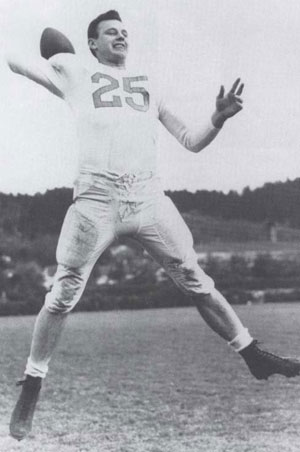Coming off a lackluster performance against against a mediocre Stanford team, Oregon would be on the road for the second consecutive week. This time the trip would be to Ann Arbor to face the Michigan Wolverines, who were coming off an unbeaten season, which included a 49-0 thrashing of Southern California in the 1948 Rose Bowl game. Michigan had tied with Notre Dame as the number one team in 1947 largely based on the win against USC.
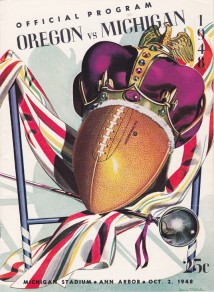 The Michigan game would be the one of the rare road trips Oregon made outside the West Coast. It would also make the first time the Ducks played a team from the Big 9 (Western Conference). The Michigan game was a late addition to Oregon’s 1948 schedule. Originally the Ducks had been scheduled to play Montana on October 2nd but had been seeking out a higher profile opponent. On February 21, 1948, Oregon and Michigan announced the agreement for this one game, with Oregon to receive 50 per cent of the gate receipts after the officials had been paid. It would take a vote by the Pacific Coast Conference’s faculty representatives to get Oregon out of its game with Montana.
The Michigan game would be the one of the rare road trips Oregon made outside the West Coast. It would also make the first time the Ducks played a team from the Big 9 (Western Conference). The Michigan game was a late addition to Oregon’s 1948 schedule. Originally the Ducks had been scheduled to play Montana on October 2nd but had been seeking out a higher profile opponent. On February 21, 1948, Oregon and Michigan announced the agreement for this one game, with Oregon to receive 50 per cent of the gate receipts after the officials had been paid. It would take a vote by the Pacific Coast Conference’s faculty representatives to get Oregon out of its game with Montana.
Michigan’s team was still loaded with talent, featuring three 1948 All-Americans, Pete Elliott, Dick Rifenburg, and Al Wistert. Michigan was coming off an season opening win over Michigan State (an independent in 1948). The game with Oregon would be played before 66,642 fans. This would be the largest crowd that the Ducks had ever played in front of. Ironically, it would be by far Michigan’s smallest home crowd in 1948. All of Michigan’s other home games would be before crowds exceeding 80,000.
Neither team was able to score in the first quarter. Oregon managed one drive to the Michigan 11-yard line, with a Van Brocklin pass to Dick Wilkins being broken up by Chuck Ortmann on fourth down. One of Michigan’s drives ended with George Bell intercepting a Chuck Ortmann pass in Oregon’s end zone.
Oregon’s first possession of the second half ended with Van Brocklin punting the ball out of bounds at the Michigan 7-yard line. Michigan quickly moved the ball out to its 40-yard line. Tailback Chuck Ortmann unleashed a pass to Dick Rifenburg, who had gotten behind Oregon safety Benny Holcomb, for a 60-yard touchdown. Michigan took a 7 to 0 lead over the Ducks. Holcomb would make up for that mistake on Michigan’s next possession. The Wolverines had driven to the Oregon 7-yard line. Michigan fullback Tom Peterson took the handoff and as he neared the goal line fumbled the ball across the goal line. Much to the chagrin of Michigan fans, Holcomb recovered the ball for the Ducks in the end zone killing Michigan’s drive. Unfortunately, the Ducks could get no closer to Michigan’s end zone than the 17-yard line.
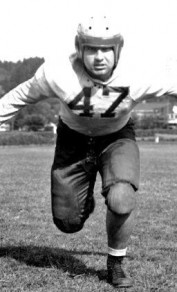 In the third quarter, Michigan was able to move to Oregon’s 23-yard line where Brad Ecklund intercepted an Ortmann pass killing that drive. Oregon would put on a drive to the Michigan 16-yard line where a Van Brocklin pass is intercepted by Ortmann. Michigan would make the most of the turnover driving to Oregon’s 2-yard line, where tailback Chuck Lentz passed to Peterson for the touchdown. Michigan now led 14 to 0.
In the third quarter, Michigan was able to move to Oregon’s 23-yard line where Brad Ecklund intercepted an Ortmann pass killing that drive. Oregon would put on a drive to the Michigan 16-yard line where a Van Brocklin pass is intercepted by Ortmann. Michigan would make the most of the turnover driving to Oregon’s 2-yard line, where tailback Chuck Lentz passed to Peterson for the touchdown. Michigan now led 14 to 0.
Oregon had additional opportunities to score in the fourth quarter. The Ducks managed to drive to the Michigan 1-yard line where they would turn the ball over on downs. Late in the fourth quarter, Van Brocklin threw a pass to Johnny McKayat the Michigan 45-yard line. McKay would take the ball the remaining distance to the end zone. Unfortunately, one of the officials ruled that McKay had stepped out of bounds on the Michigan 23-yard line. Oregon would fail to advance the ball any further than the 21- yard line. After the game, a number of sideline observers thought McKay never got any closer to the sideline than six inches. McKay recounted after the game that Michigan fans told him he was the best actor since the late John Barrymore.
Former Duck head coach Clarence “Doc” Spears, then a physician in Michigan, offered his opinion that Oregon was just as good as two of the other top Big 9 teams, Northwestern and Purdue. Interestingly, Michigan would dismantle Purdue the next Saturday 40 to 0, and Northwestern a week later 28 to 0. Michigan would again go undefeated and be ranked the top team in the country. Unfortunately, Michigan would not go bowling in 1948 because of the Big 9’s two-year no repeat rule for the Rose Bowl.
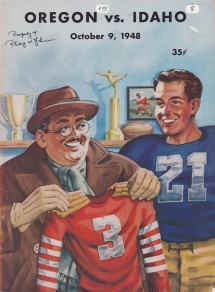 While the loss hurt, it certainly proved Oregon could play with the best teams in the country. Now it was time for a third consecutive road trip, this time to Moscow, Idaho.
While the loss hurt, it certainly proved Oregon could play with the best teams in the country. Now it was time for a third consecutive road trip, this time to Moscow, Idaho.
On October 9th, the Ducks met the Vandals at Neale Stadium in front of 12,550 fans, a far cry from the crowd in Ann Arbor a week earlier. Idaho’s squad did not have many outstanding players on it, but it did have a future Duck on its coaching staff. Steve Belko, who would go on to become Oregon’s head basketball coach in 1956, was the head freshman coach for both football and basketball at Idaho.
This game, while resulting in an Oregon victory, featured some incredibly sloppy play by the Ducks with seven turnovers, six of them on fumbles, and 10 penalties.
Idaho would draw first blood following McKay’s fumble of the opening kickoff on the 20-yard line. The Vandal’s Bud Riley (father of Oregon State’s Mike Riley) would score on the next play. The extra point attempt was no good. Idaho took a 6 to 0 lead. Oregon’s first points of the game would come on a safety when Bob Mays stepped on the end line while attempting to punt out of the end zone. Idaho 6 Oregon 2. The Ducks would get their first touchdown in the second quarter on a 16 yard run by McKay. Oregon 9 Idaho 6.
Idaho would draw within a point. Following another McKay fumble, Bob Mays threw a pass towards Oregon’s end zone that was intercepted by Wayne Bartholemy. The problem was that Bartholemy’s momenturn carried him into the end zone where he was tackled by the Vandals’ Ted Diehl for a safety. Oregon 9 Idaho 8. Oregon would close out its scoring in the third quarter with a 15 yard pass from Van Brocklin to Dan Garza. The point after touchdown was no good. Oregon 15 Idaho 8.
Oregon totally dominated Idaho statistically, including 382 rushing yards. However, the seven turnovers made the game closer than it should have been.
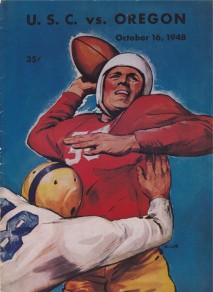
Next up was Southern California on October 16th in Portland. Southern California was the defending Pacific Coast Confere
ncechampion, and had pretty much “owned” Oregon in their previous meetings. Oregon only had one victory over USC in 1941, and a tie in 1939. However, Oregon was a slight favorite to win the game.
In the week leading up to the game, McKay was seen walking around campus carring a sign saying “My knee is okay. I’ll be okay for Saturday. McKay had first injured his knee at Michigan and aggravated it against Idaho. McKay would not play against the Trojans and would have only one carry against the Cougars. In McKay’s absence, Woodley Lewis would become the starting left halfback.
The game would be played before a record crowd of 33,000 at Multnomah Stadium. Southern California came to Portland with a very talented team led by a number of players who would go on to professional careers including, Don Doll, Ed Henke, Bill Jessup, Volney Peters, and Jim Powers. It would be Oregon, however, that would score first.
The Ducks struck first in the first quarter on a 46 yard pass from Van Brocklin to Wilkins. The extra point attempt failed. Oregon 6 USC 0. Oregon’s only other points in the game would come in the second quarter when Garza blocked a punt by Dean Dill in the end zone for a safety. Oregon 8 USC 0. Oregon had other opportunities to blow the game open in the first half, with drives being stopped on the Trojan 1-yard and 2-yard line.
Southern California would score its only points in the third quarter on a 2 yard run by Don Doll. The extra point was good. Oregon 8 USC 7. The Ducks were not completely out of the woods. On the last play of the game Jim Powers threw a pass to Bill Jessup. Holcomb was called for pass interference, giving the Trojans another opportunity to score. Southern California elected to try a field goal. Tom Hamilton’s kick from the 31 yard line was short and wide. The Ducks had held on for the victory and a four win one loss record.
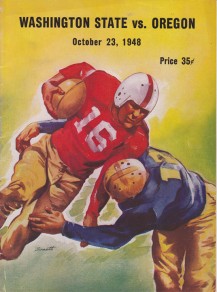 October 25th would be Oregon’s Homecoming game against the Washington State Cougars. In the week leading up to the game several questions would be raised including Oregon’s perceived lack of a power running game in short yardage situations near the goal line. However, it was another issue that got attention from the media - the fans anticipation that Oregon would go to the Rose Bowl if Oregon and California both won the remainder of their games. At the time, Oregon was rated no better than 35th in the country, while undefeated California was ranked 4th.
October 25th would be Oregon’s Homecoming game against the Washington State Cougars. In the week leading up to the game several questions would be raised including Oregon’s perceived lack of a power running game in short yardage situations near the goal line. However, it was another issue that got attention from the media - the fans anticipation that Oregon would go to the Rose Bowl if Oregon and California both won the remainder of their games. At the time, Oregon was rated no better than 35th in the country, while undefeated California was ranked 4th.
The Pacific Coast Conference had adopted the no repeat rule that prevented USC from being eligible for the 1949 Rose Bowl. The other part of the rule, which had been pushed by Oregon’s faculty representative, Orlando John Hollis, was that the team that had not played in the Rose Bowl for the longest would get the bowl bid if there was a tie vote for the selection of the Conference representatve. That would seem to have favored Oregon which had not played in the Rose Bowl since 1920 (Idaho and Montana had never been to the Rose Bowl and would never go.).
There was an assumption that all six Northern Division teams would vote for Oregon, and the four Southern Division teams for California. As Dick Strite pointed out in his Highclimber column on October 21st, Idaho, Montana, and Washington State could probably be counted on to vote for Oregon. However, Washington could not be counted on because of its history of hostility toward Oregon, and Oregon State had already indicated that it thought California was the better team and considering anyone else would be “silly”. It was Strite’s opinion that Oregon would have to win its remaining games by a significant scoring margin if it was to get the Rose Bowl bid. Oregon was about to take its first step in meeting Strite’s challenge.
Washington State came to Eugene sporting a three and one record, and was coming off an upset win over the Huskies the week before. The Cougars only loss had been to UCLA in the season opener. WSU certainly was not without talent including future pro players Bob Gambold, Laurie Niemi, Don Paul, Fran Polsfoot, LaVern Torgeson, and Jerry Williams. Also on that roster was Chuck “Bobo” Brayton, who would go on the be head baseball coach at WSU for many years, and Bob Doornink, the father of former Seahawks running back Dan Doornink. The game would be played before a crowd of 19,500.
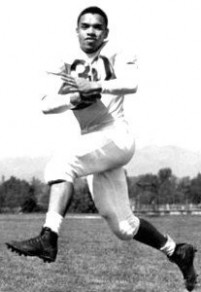 Neither team was able to score in the first quarter. In the second quarter, Oregon mounted an 89 yard drive that culminated with Keith DeCoursey scoring from the 1-yard line on a new play Jim Aiken referred to as the “Goal Line Two”. Oregon 7 WSU 0. Washington State would get its only points of the day on a 73 yard run by Don Paul. Oregon 7 WSU 7.
Neither team was able to score in the first quarter. In the second quarter, Oregon mounted an 89 yard drive that culminated with Keith DeCoursey scoring from the 1-yard line on a new play Jim Aiken referred to as the “Goal Line Two”. Oregon 7 WSU 0. Washington State would get its only points of the day on a 73 yard run by Don Paul. Oregon 7 WSU 7.
Oregon would score twice in the third quarter on a nine yard run by Bob Sanders, and another one yard run by DeCoursey. Oregon 26 WSU 7. Oregon’s final score would come in the fourth quarter on a 19 yard Van Brocklin pass. Oregon 33 WSU 7. This would be a breakout game for Woodley Lewis who ran for 103 yards on 12 carries in McKay’s absence. Lewis’s numbers would not match those of the Cougars’ Don Paul who had 140 yards on 10 carries. If there was anything negative for Oregon in this game it was the 10 penalties imposed on the Ducks.
In Part Three we’ll cover the final four regular season games.
Related Articles:
Jim currently resides in Ellensburg, Washington where he has had the opportunity to watch former Ducks such as NaDerris Ward and Scott Grady play for Central Washington University, Jim’s alma mater. However, Jim was born in Eugene and attended Howard Elementary School, and what then called Colin Kelly Junior High School before moving to Washington. Jim began following the Ducks during the 1957 season and had the opportunity to watch a number of games at Hayward Field. Over the years, Jim has developed a wealth of knowledge about Oregon sports history. When not editing on Fanbase.com or working in his garden, Jim manages to find time to practice law.

